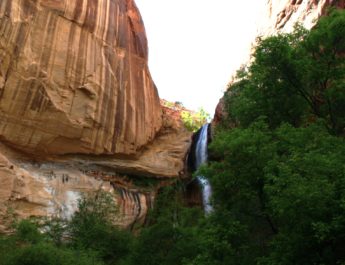Genesis 7
BibleHub
1 Then the LordA said to Noah,B “Go into the ark,C you and all your household,D
Notes on verse 1a
A “Lord” = YHVH. From havah (to be, become) or hayah (to come to pass, become, be). This is the name of the God of Israel, the self-existent and eternal one, the tetragrammaton. This pronunciation has been lost to time so “Lord” is generally used in its place.
B “Noah” = Noach. From nuach (to rest, calm, camp, free, place, remain, satisfy, settle, station, or wait; implies settling down in a literal or figurative sense). This is Noah or Noach, meaning rest.
C “ark” = tebah. Probably from Egyptian T-b-t (chest, coffin). Used for Moses’ basket, Noah’s ark, and the ark of the covenant.
D “household” = bayit. Probably from banah (to build, make, set up, obtain children; to build literally or figuratively). This is house, court, family, palace, temple.
for I have seenE that you alone are righteousF beforeG me in this generation.H
Notes on verse 1b
E “seen” = raah. This is to see in a literal or figurative sense so stare, advise, think, view.
F “righteous” = tsaddiq. From the same as tsedeq (rightness, righteousness, just cause, vindication; that which is right in a natural, moral, or legal sense; abstractly equity; figuratively prosperity). This is just, innocent, righteous, righteous one, or lawful.
G “before” = paneh. From panah (to turn, face, appear). This is face in a literal or figurative sense. It could be face, presence, anger, respect. It can also be used of God to indicate divine favor or presence.
H “generation” = dor. From dur (to move in a circle, which implies living somewhere or remaining there; it can also be the sense of piling or heaping up). This is a revolution of time, which is to say, an age or generation. It can also be a dwelling or one’s posterity.
2 Take with you seven pairsI of all cleanJ animals,K the maleL and its mate;M and a pairN of the animals that are not clean, the male and its mate;
Notes on verse 2
I “seven pairs” = sheba + sheba. Literally “seven seven.” This is seven or by sevenfold. It can also be used to imply a week or an indefinite number. Symbolically, this is the number of fullness, sacredness, perfection.
J “clean” = tahor. From taher (bright, which implies being pure or clean; to purge, cleanse, or purify; clean in a ritual sense or a moral one (i.e. moral or holy)). This is clean or pure in a literal, ritual, or ethical sense.
K “animals” = behemah. This is animal or cattle. It is often used of large quadrupeds.
L “male” = ish. Perhaps from enosh (human, humankind, mortal); from anash (to be weak, sick, or frail). This is man, husband, another, or humankind.
M “mate” = ishshah. Related to “male” in v2. Perhaps from ish (see note L above). This is woman, wife, or female.
N “pair” = shenayim. From sheni (double, again, another, second); from shanah (to fold, repeat, double, alter, or disguise). This is two, both, second, couple.
3 and seven pairs of the birdsO of the airP also, maleQ and female,R
Notes on verse 3a
O “birds” = oph. From uph (to fly, flee, shine, be weary, be faint). This is a flying creature.
P “air” = shamayim. Root may mean being lofty. This is sky, the air, or heaven. It is in a dual noun form so this might refer to the part of the sky where the clouds move on the one hand and the part beyond that where the sun, moon, and stars are on the other hand.
Q “male” = zakar. From zakar (to remember, to mark something so that it can be recalled, to be mindful of, to mention). This is male. Properly, perhaps, it means one who is remembered, which is to say a male.
R “female” = neqebah. From naqab (to pierce, bore holes, puncture; to make a hole more or less forcefully; also to curse or libel). This is female or woman from an anatomical reference.
to keep their kindS aliveT on the faceU of all the earth.V
Notes on verse 3b
S “kind” = zera. From zara (to sow or scatter seed; conceive or yield). This is seed or sowing. It can, thus, mean a fruit, plant, sowing time, child, offspring, or posterity.
T “keep…alive” = chayah. This is to live or keep alive in a literal or figurative sense. So, it an be revive, nourish, or save.
U “face” = paneh. Same as “before” in v1. See note G above.
V “earth” = erets. Root may mean to be firm. This is earth, ground, field land, or country.
4 For in seven days I will send rain on the earth for fortyW days and forty nights;X and every living thingY that I have madeZ
Notes on verse 4a
W “forty” = arbaim. From the same as arba (four); from raba (to make square or be four-sided); perhaps from raba (to lie down flat; can be to lie for mating). This is forty.
X “nights” = layil. Properly, this refers to light twisting away. It is used for night or midnight. Figuratively, this can mean adversity.
Y “living thing” = yequm. 3x in OT. From qum (to arise, stand, accomplish, establish, abide; rising against, getting up after being sick or asleep, arising from one state to another, becoming powerful, or rising for action; standing in a figurative sense). This is a living thing, something that exists, a substance.
Z “made” = asah. This is to make, do, act, appoint, become in many senses.
I will blot outAA from the face of the ground.”BB 5 And Noah didCC all that the Lord had commandedDD him.
Notes on verses 4b-5
AA “blot out” = machah. This is to rub, which implies to erase. It can also be making something smooth with grease or oil. So, this could we wipe out, blot out, or destroy. Also, to touch or reach.
BB “ground” = adamah. From the same as adam (man, humankind); perhaps from ‘adom (to be red). This is ground, earth, soil as red, or land.
CC “did” = asah. Same as “made” in v4. See note Z above.
DD “commanded” = tsavah. This is to charge, command, order, appoint, or enjoin. This is the root that the Hebrew word for “commandment” comes from (mitsvah).
6 Noah was sixEE hundred years oldFF when the floodGG of watersHH cameII on the earth.
Notes on verse 6
EE “six” = shesh. This is six. Figuratively, it can be a surplus since it is one more than the number of fingers on the hand.
FF “old” = ben. Related to “household” in v1. Perhaps from banah (see note D above). This is son, age, child. It is son in a literal or figurative sense.
GG “flood” = mabbul. 13x in OT. Perhaps from yabal (to bring, carry, flow, lead forth). This is a flood or deluge.
HH “waters” = mayim. This is water, waters, or waterway in a general sense. Figuratively, it can also mean juice, urine, or semen.
II “came” = hayah. Related to “Lord” in v1. See note A above.
7 And Noah with his sonsJJ and his wifeKK and his sons’ wives went into the ark to escapeLL the waters of the flood. 8 Of clean animals, and of animals that are not clean, and of birds, and of everything that creepsMM on the ground,
Notes on verses 7-8
JJ “sons” = ben. Same as “old” in v6. See note FF above.
KK “wife” = ishshah. Same as “mate” in v2. See note M above.
LL “to escape” = paneh. Literally “in the face of,” which is to say, “because.” Same as “before” in v1. See note G above.
MM “creeps” = ramas. 17x in OT. This is gliding swiftly, moving with quick steps or crawling. It is to swarm or prowl or move about.
9 twoNN and two, male and female,OO went into the ark with Noah, as GodPP had commanded Noah. 10 AndQQ after seven days the waters of the flood came on the earth.
Notes on verses 9-10
NN “two” = shenayim. Same as “pair” in v2. See note N above.
OO “male and female” = zakar + neqebah. Same as “male and female” in v3. See notes Q & R above.
PP “God” = Elohim.
QQ {untranslated} = hayah. Same as “came” in v6. See note II above.
11 In the six hundredth year of Noah’s life,RR in the secondSS month,TT on the seventeenthUU day of the month,
Notes on verse 11a
RR “life” = chay. Related to “keep…alive” in v3. From chayah (see note T above). This is alive, living, lifetime. It can also be used to describe someone’s age. It can refer to animals, plants, water, or a company or congregation of people. It is life in a very broad sense.
SS “second” = sheni. Related to “pair” in v2. See note N above.
TT “month” = chodesh. From chadash (to renew, repair). This refers to a new moon. It can also mean monthly.
UU “seventeenth” = sheba + asar. Sheba is the same as “seven pairs” in v2. See note I above. Asar is from eser (ten). This is teen or -teenth.
on that day all the fountainsVV of the greatWW deepXX burst forth,YY
Notes on verse 11b
VV “fountains” = mayan. From ayin (eye, appearance; eye in a literal or figurative sense; a fountain). This is a spring, well, or fountain. Figuratively, this is a source of contentment.
WW “great” = rab. From rabab (increasing in any aspect whether quantity, authority, size, quality, greatness, etc.). This is abundance, many, elder, exceedingly, great. It refers to abundance of amount, rank, or status.
XX “deep” = tehom. Perhaps from hum (to roar, murmur, cause an uproar, agitate; to defeat in battle, destroy). This is the deep or the abyss. Either understood as a formless empty place of nothingness or as a place of confusion filled with water – the deep the feeds the waters of the earth.
YY “burst forth” = baqa. This is to break open, breach, divide, rip, shake, tear. It can also mean dash into pieces or being ready to burst.
and the windowsZZ of the heavensAAA were opened.BBB 12 The rainCCC fellDDD on the earth forty days and forty nights.
Notes on verses 11c-12
ZZ “windows” = arubbah. 9x in OT. From arab (to ambush, lurk, lie in wait). This is a window, lattice, dove-cote, chimney. It can also refer to floodgates. It is often used for the floodgates in the sky that open when great rains come (as in the Great Flood).
AAA “heavens” = shamayim. Same as “air” in v3. See note P above.
BBB “opened” = patach. This is to open wide in a literal or figurative sense. So, it is open, draw out, let something go free, break forth. It can also mean to plow, engrave, or carve.
CCC “rain” = geshem. Perhaps from gasham (to rain). This is rain, shower, or rainy. It can be used figuratively for blessing or for destruction.
DDD “fell” = hayah. Same as “came” in v6. See note II above.
13 On the veryEEE same day Noah with his sons, ShemFFF and HamGGG and Japheth,HHH and Noah’s wife and the threeIII wives of his sons entered the ark,
Notes on verse 13
EEE “very” = etsem. From atsam (vast, numerous, strong; to close one’s eyes, to make powerful; to break bones). This is self, life, strength, bone, or substance.
FFF “Shem” = Shem. 17x in OT. From the same as shem (name, fame, renown; indicates something essential about a person –about their individuality; can also mean honor, authority, or character); perhaps from sum (to put, place, set). This is Shem, meaning name.
GGG “Ham” = Cham. 16x in OT. Perhaps from the same as cham (hot, warm); from chamam (to be warm, heat; to be hot in a literal or figurative sense; to mate). This is Ham, meaning “hot” or “protective wall.” See https://www.abarim-publications.com/Meaning/Ham.html
HHH “Japheth” = Yepheth. 11x in OT. From pathah (to be simple, entice, deceive, persuade, allure, be silly); from pethi (simple, silly, foolish, easily deceived); from pathah (to be wide open, deceive, entice, persuade, to be simple, delude). This Japheth, meaning expansion.
III “three” = shalosh. This is three, fork, three times.
14 they and every wild animalJJJ of every kind,KKK and all domestic animalsLLL of every kind, and every creeping thingMMM that creeps on the earth, and every bird of every kind—every bird,NNN every winged creature.OOO
Notes on verse 14
JJJ “wild animal” = chay. Same as “life” in v11. See note RR above.
KKK “kind” = min. This is kind, sort, or species.
LLL “domestic animals” = behemah. Same as “animals” in v2. See note K above.
MMM “creeping thing” = remes. Related to “creeps” In v8. 17x in OT. From ramas (see note MM above). This is things that move rapidly or creep such as reptiles.
NNN “bird” = tsippor. From tsaphar (to skip about, maybe to depart). This is a little bird like a sparrow – a little bird as one that hops about.
OOO “winged creature” = kanaph. This is wing, edge, corner, extremity. It can also be a flap or fold of a garment or the pinnacle of a building.
15 They went into the ark with Noah, two and two of all fleshPPP in which there was the breathQQQ of life. 16 And those that entered, male and femaleRRR of all flesh, went in as God had commanded him; and the Lord shut him in.SSS
Notes on verses 15-16
PPP “flesh” = basar. From basar (being a messenger, publish, carry preach; properly, this is being fresh, rosy or cheerful as one bearing news). This is flesh, the body, fat, skin, self, nakedness, humankind, or kin. It can also refer to private parts.
QQQ “breath” = ruach. This is breath, wind, air, cool, spirit. This is wind, which resembles the breath and so this can be used figuratively for life itself or being frail/mortal/impermanent. It can refer to the air of the sky or the spirit.
RRR “male and female” = zakar + neqebah. Same as “male and female” in v3. See notes Q & R above.
SSS “shut…in” = sagar. This is to shut up, imprison, lock, hand over, or figuratively surrender.
17 The flood continuedTTT forty days on the earth; and the waters increased,UUU and bore upVVV the ark, and it rose highWWW above the earth.
Notes on verse 17
TTT “continued” = hayah. Same as “came” in v6. See note II above.
UUU “increased” = rabah. This is increasing in any aspect whether quantity, authority, size, quality, greatness, etc.
VVV “bore up” = nasa. This to lift in a broad sense, literally and figuratively. So it could be to carry, take, or arise. It could also be bring forth, advance, accept.
WWW “rose high” = rum. This is to rise or raise, to be high literally or figuratively. So it can also mean to exalt or extol.
18 The waters swelledXXX and increased greatly on the earth; and the ark floatedYYY on the face of the waters. 19 The waters swelled so mightily on the earth that all the highZZZ mountains under the whole heaven were covered;AAAA
Notes on verses 18-19
XXX “swelled” = gabar. This is to be strong or mighty. It can mean to prevail or to be insolent.
YYY “floated” = halak. This is go, come, walk. It is walk literally and figuratively and includes people and animals. It can be used figuratively for one’s moral life – how we walk according to God’s way or against it. It can also refer to the walk of life as in the course one’s life takes, the choices we make, etc.
ZZZ “high” = gaboah. From gabah (to be tall, high, exalted, proud, haughty). This is high, tall, long, proud, or arrogant. It could also be a high ranking official, someone exalted, or something lofty.
AAAA “covered” = kasah. This is to cover, conceal, overwhelm. It is to cover as clothes do or to hide a secret.
20 the waters swelled above the mountains, covering them fifteenBBBB cubitsCCCC deep. 21 And all flesh diedDDDD that movedEEEE on the earth, birds,FFFF
Notes on verses 20-21a
BBBB “fifteen” = chamesh + asar. Chamesh is five or fifth. Asar is the same as “seventeenth” in v11. See note UU above.
CCCC “cubits” = ammah. From the same as em (mother). This is a cubit, post, threshold, pivot. It is mother as the basic measure (the length of the forearm). It is also mother as the which bonds an entryway i.e. the base of the door.
DDDD “died” = gava. This is to breathe out, which implies expire or die.
EEEE “moved” = ramas. Same as “creeps” in v8. See note MM above.
FFFF “birds” = oph. Same as “birds” in v3. See note O above.
domestic animals, wild animals, all swarming creaturesGGGG that swarmHHHH on the earth, and all human beings;IIII
Notes on verse 21b
GGGG “swarming creatures” = sherets. 15x in OT. From sharats (to swarm, creep, abound, breed a lot, wriggle). This is things that teem or swarm – insects, moving creatures.
HHHH “swarm” = sharats. Related to “swarming creature” in v21. 14x in OT. See note GGGG above.
IIII “human beings” = adam. Related to “ground” in 4. See note BB above.
22 everything on dry landJJJJ in whose nostrilsKKKK was the breathLLLL of life died.MMMM
Notes on verse 22
JJJJ “dry land” = charabah. 8x in OT. From chareb (to be waste or desolate, destroyer). This is dry ground, dry, or desert.
KKKK “nostrils” = aph. From anaph (to be angry; properly, breathing hard as a signifier of being enraged). This properly refers to the nose or nostril and by extension the face. It can specifically refer to anger or wrath as one breathes hard and nostrils flare in times of great anger.
LLLL “breath” = neshamah + ruach. Neshamah is from nasham (to blow away, pant, gasp). This is a breath or blast – a puff like of wind. It is also a spirit or soul or divine inspiration or intellect. It could also be an animal. This is the word used for the breath of life when humanity was created in Genesis 2:7. Ruach is the same as “breath” in v15. See note QQQ above.
MMMM “died” = mut. This is to die in a literal or figurative sense. It can also refer to being a dead body.
23 He blotted out every living thing that was on the face of the ground, human beings and animals and creeping things and birdsNNNN of the air; they were blotted out from the earth. Only Noah was left,OOOO and those that were with him in the ark. 24 And the waters swelled on the earth for one hundred fiftyPPPP days.
Notes on verses 23-24
NNNN “birds” = oph. Same as “birds” in v3. See note O above.
OOOO “was left” = shaar. Properly, this is swelling up i.e. being left over, a remnant, remaining, being redundant.
PPPP “fifty” = chamishshim. Related to “fifteen” in v20. From chamesh (see note BBBB above). This is fifty.
Image credit: “The Deluge” by Francis Danby, circa 1840.




